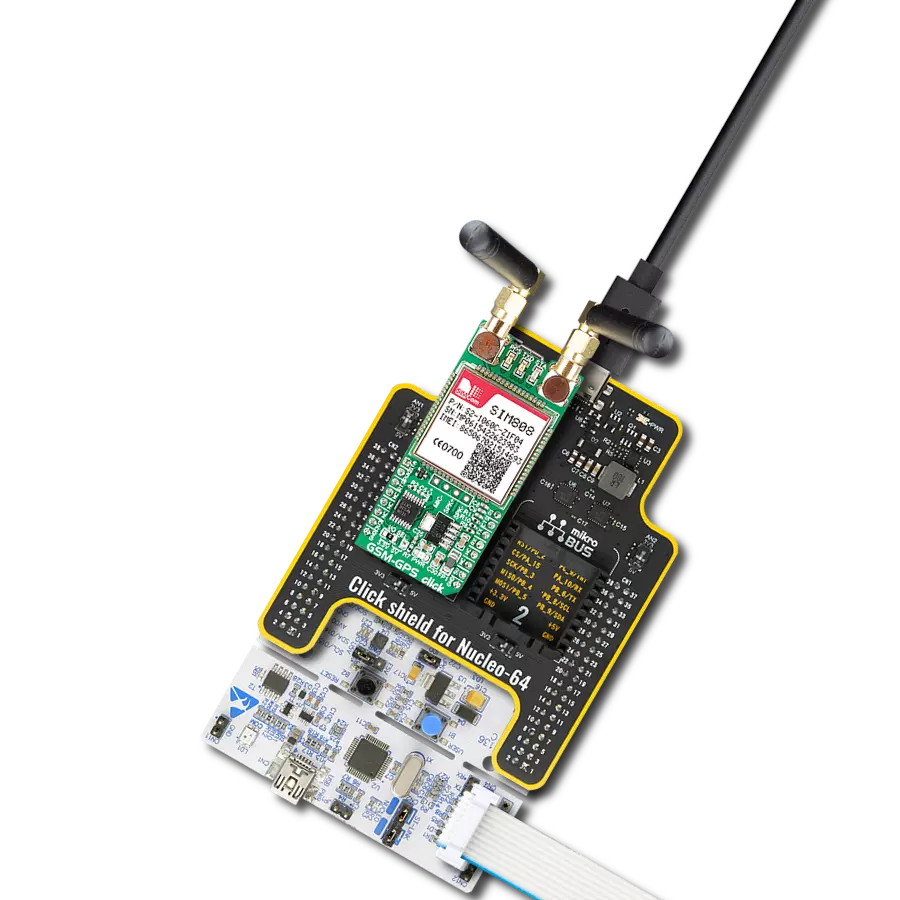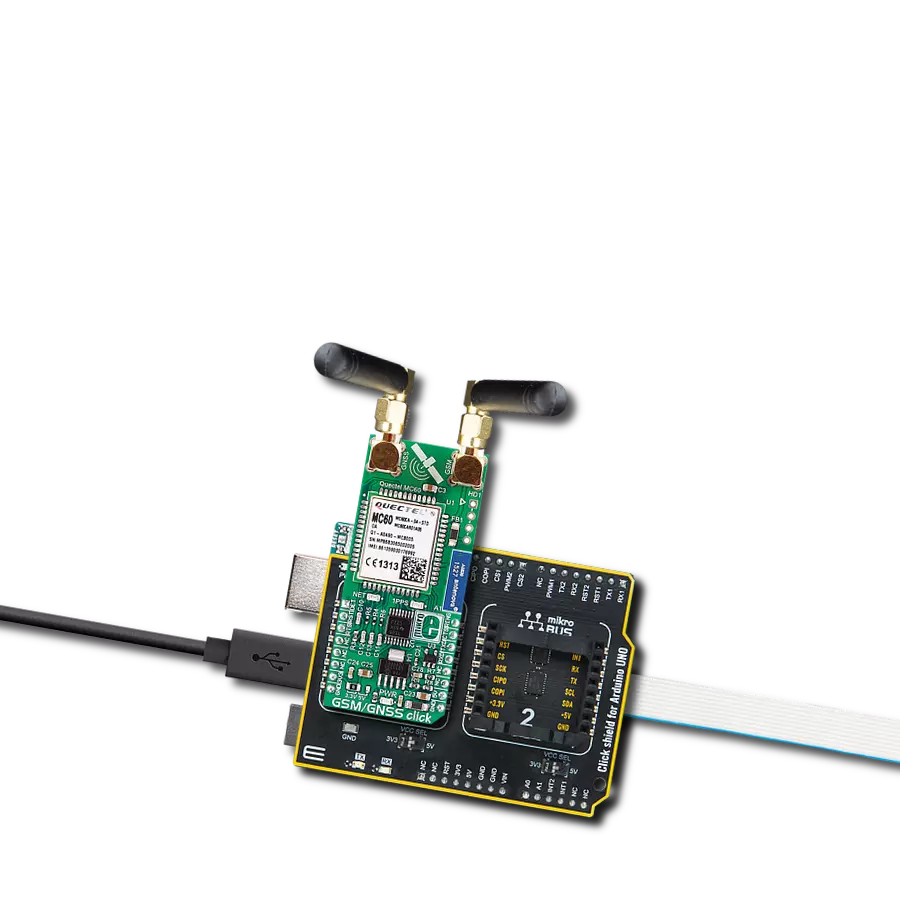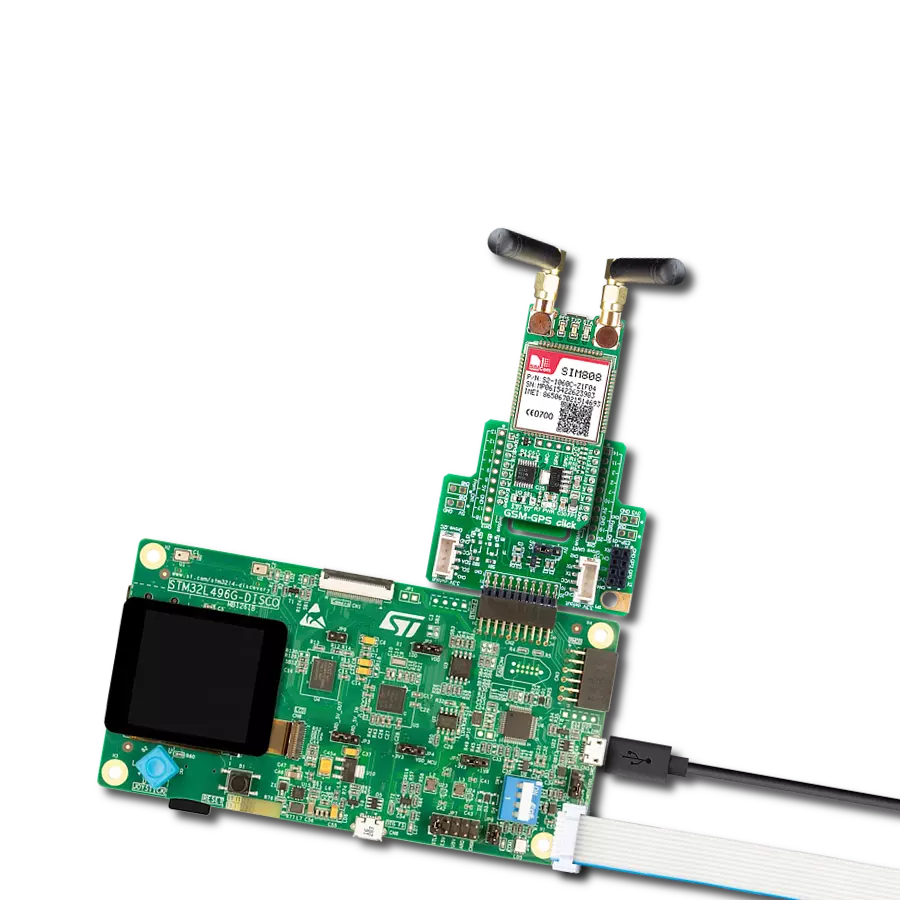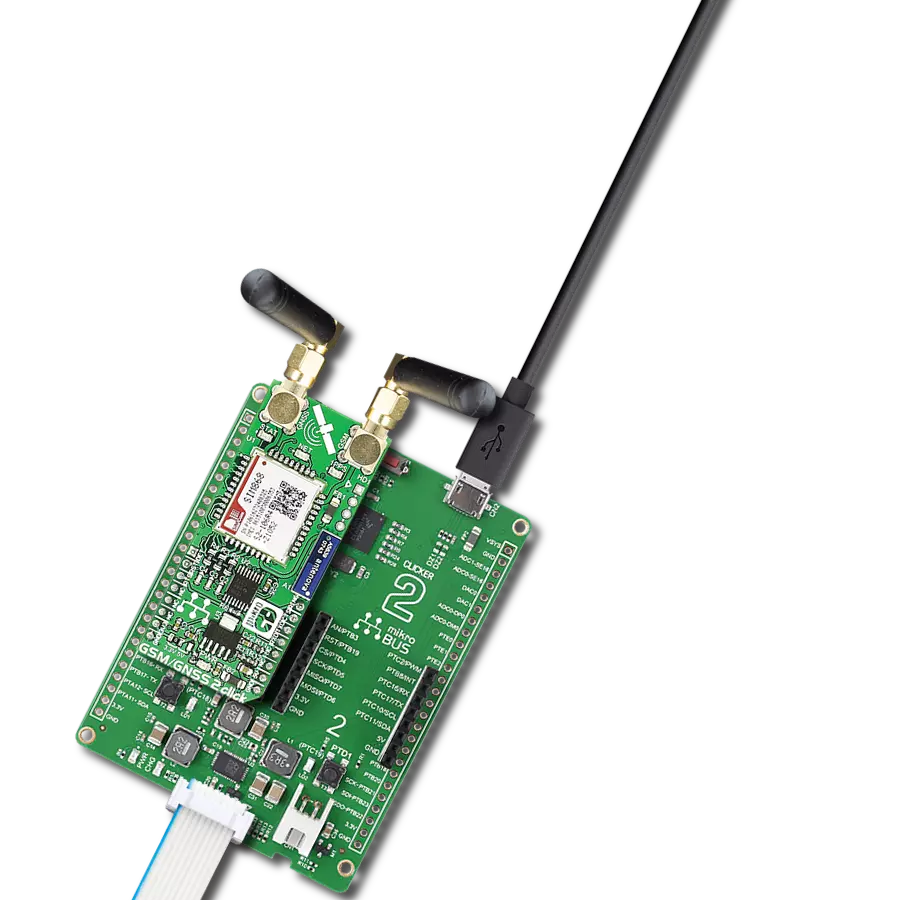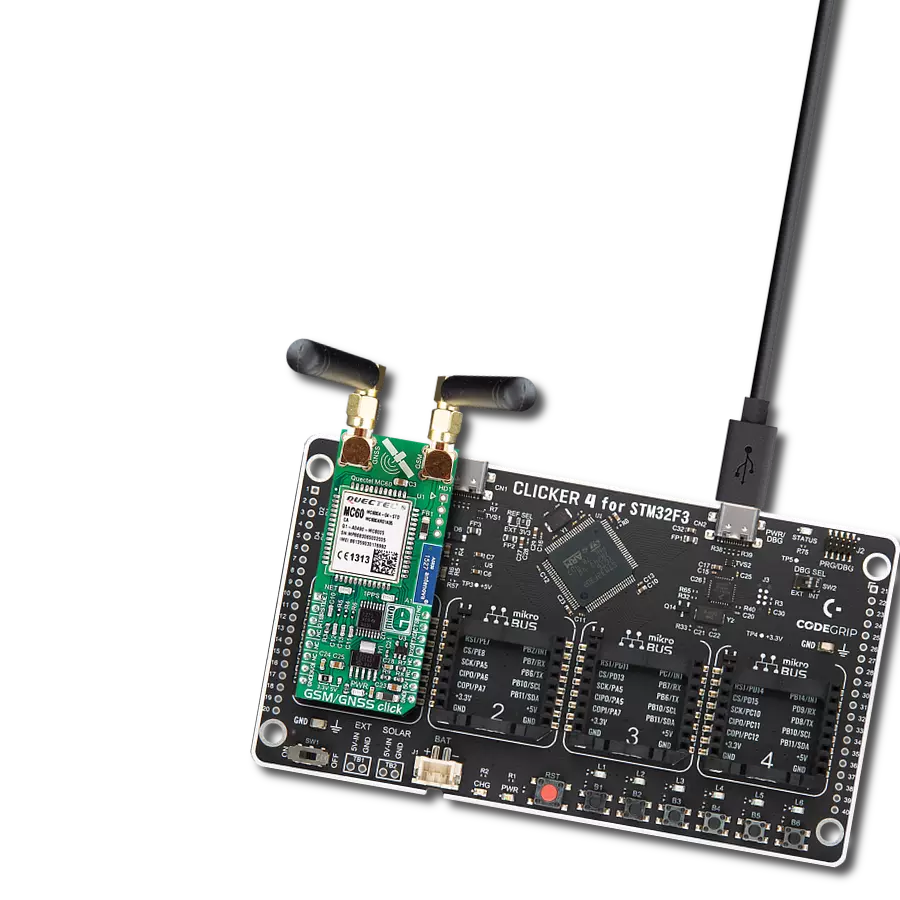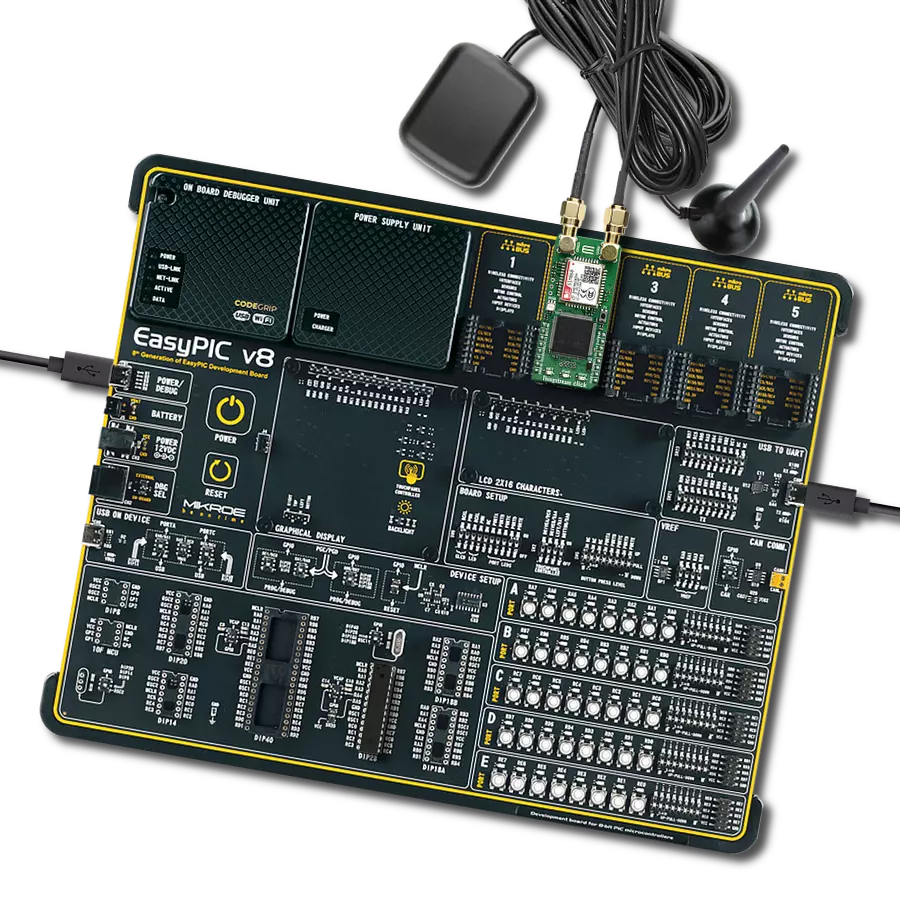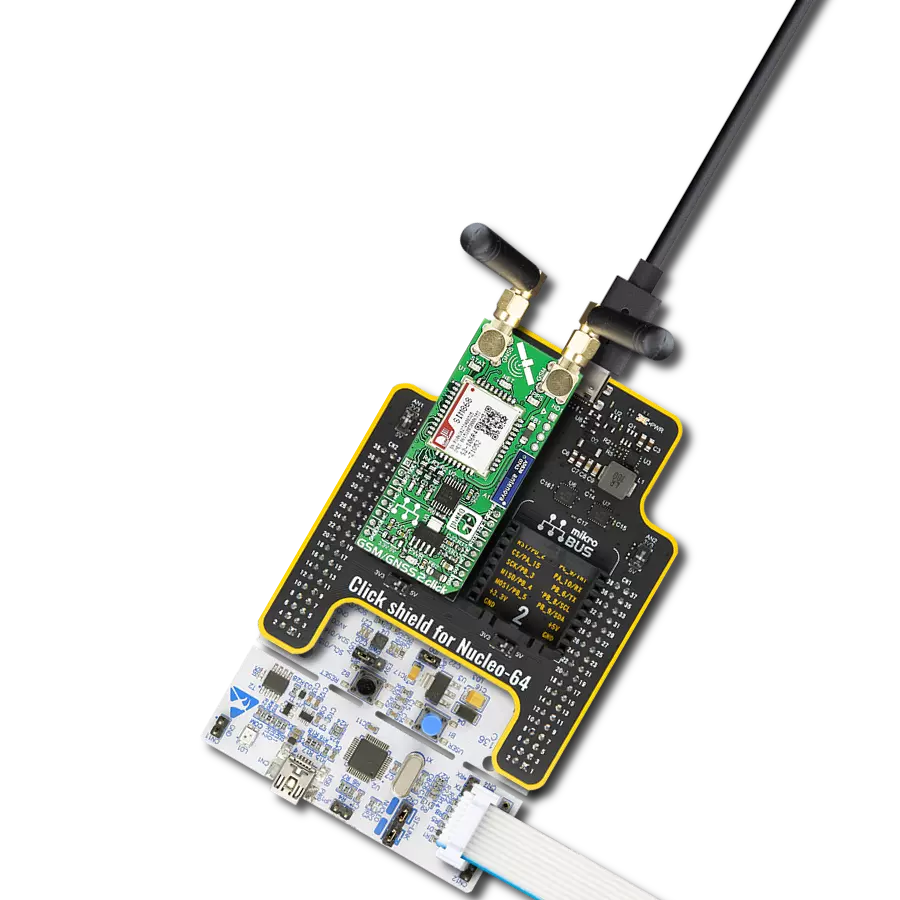着眼于简化连接和位置跟踪,我们旨在为各种企业提供一种单一的集成设备,该设备提供实时GPS数据以及可靠的GSM/GPRS通信功能,从而增强其实力。
A
A
硬件概览
它是如何工作的?
GSM-GPS Click基于SIMCom的SIM808模块,是一款支持GSM/GPRS和GPS的高度集成模块。SIM808是一款高度集成的模块,支持0710 MUX协议、TCP/UDP协议、FTP/HTTP、MMS、POP3/SMTP、DTMF、干扰检测、音频记录、SSL、可选的蓝牙3.0、TTS CN,并具有嵌入式AT。对于与外界的连接,该Click板具有两个SMA连接器,用于GSM/GPRS和GPS收音机,MIKROE公司提供了相应的天线,以提高范围和接收信号强度。此外,GSM-GPS Click板下方有一个微型SIM卡槽和一个微型USB连接器,可与PC连接。SIM808有三种操作模式。正常模式有几个功能:GSM/GPRS休眠、GSM空闲、GSM通话、GPRS待机、GPRS数据和充电。电源关闭模式关闭模块的基带部分,软件不活动,串口不可访问,而RTC保持活动状态。最低功能模式下,模块的射频部分将
不工作,SIM卡将无法访问,或者两者都不工作,但串口仍可访问。AT命令集设置了最后两种操作模式。SIM808的GPRS类12可以实现高达85.6Kbps的数据速率(下行/上行),同时使用CS-4编码方案。它可以通过GSM/GPRS处理短信,支持点对点MO和MT,短信小区广播,文本和PDU模式。还支持PBCCH、PP堆栈和USSD。GPS接收机具有22个跟踪和66个获取通道,跟踪灵敏度为-165dBm。冷启动对-148dBm的敏感度较低。重要的是TTFF,在热启动时小于一秒,但在冷启动时为32秒。水平位置的精度在2.5m CEP以下。还有几个LED用于视觉状态显示。PPS代表每秒脉冲,与接收机时间有关。TXD LED表示网络状态,STA LED表示上电状态。GSM-GPS具有4针标头,用于差分音频输出的接口,并输入连接扬声器和麦克风。SIM808使用UART接口,其中常用的
UART RX和TX引脚作为其默认通信协议与主机MCU进行通信,支持从1200bps到11520bps的波特率。UART接口还配有RTS(请求发送)和CTS(清除发送)引脚。此外,Click板还具有通过mikroBUS™信号访问的其他功能,例如STA引脚上的上电状态(与STA LED上的状态相同)。可以通过拉低PWK引脚(电源键)1秒钟来关闭SIM808的电源。有一个环指示器(RI)用于明显的目的。对于逻辑电平转换,此Click板使用了来自德州仪器的TXB0106,这是一款具有自动方向感知和ESD保护的6位双向电平转换和电压转换器。此Click板可以通过I/O SEL跳线选择3.3V或5V逻辑电压电平进行操作。这样,既可以使用3.3V又可以使用5V的MCU来正确使用通信线路。但是,Click板配备了一个包含易于使用的功能和示例代码的库,可用作进一步开发的参考。
功能概述
开发板
Curiosity PIC32 MZ EF 开发板是一个完全集成的 32 位开发平台,特点是高性能的 PIC32MZ EF 系列(PIC32MZ2048EFM),该系列具有 2MB Flash、512KB RAM、集成的浮点单元(FPU)、加密加速器和出色的连接选项。它包括一个集成的程序员和调试器,无需额外硬件。用户可以通过 MIKROE
mikroBUS™ Click™ 适配器板扩展功能,通过 Microchip PHY 女儿板添加以太网连接功能,使用 Microchip 扩展板添加 WiFi 连接能力,并通过 Microchip 音频女儿板添加音频输入和输出功能。这些板完全集成到 PIC32 强大的软件框架 MPLAB Harmony 中,该框架提供了一个灵活且模块化的接口
来应用开发、一套丰富的互操作软件堆栈(TCP-IP、USB)和易于使用的功能。Curiosity PIC32 MZ EF 开发板提供了扩展能力,使其成为连接性、物联网和通用应用中快速原型设计的绝佳选择。
微控制器概述
MCU卡片 / MCU
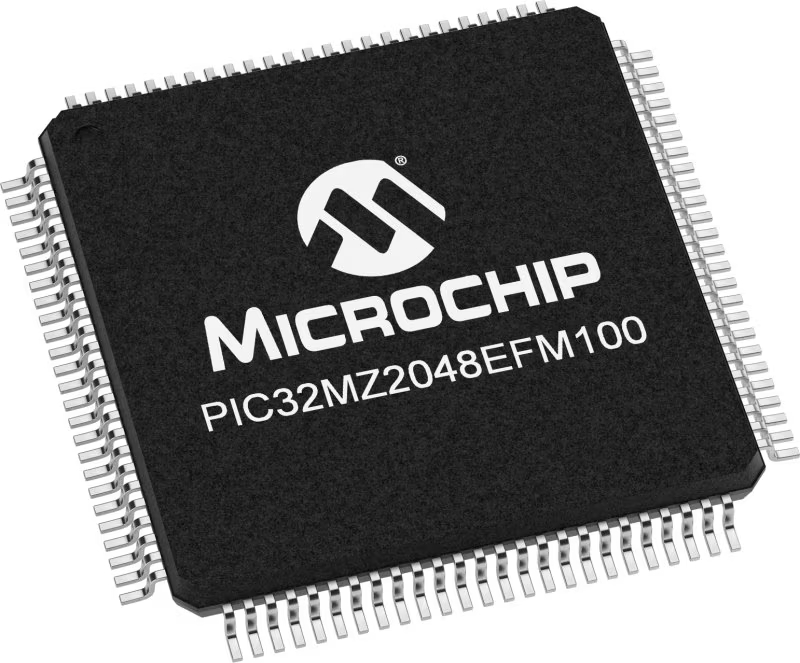
建筑
PIC32
MCU 内存 (KB)
2048
硅供应商
Microchip
引脚数
100
RAM (字节)
524288
你完善了我!
配件
橡胶天线 GSM/GPRS 直角型是我们广泛系列 GSM Click board™ 的理想伴侣。这款专用天线旨在优化您的无线连接,具有令人印象深刻的特点。其宽频范围涵盖 824-894/1710-1990MHz 或 890-960/1710-1890MHz,可处理各种频段,确保无缝可靠的连接。该天线具有 50 欧姆的阻抗和 2dB 的增益,增强了信号接收和传输。其 70/180MHz 的带宽为各种应用提供了灵活性。垂直极化进一步提升了其性能。这款天线的最大输入功率容量为 50W,即使在苛刻条件下也能保证强大的通信。尺寸紧凑,长度为 50mm,带有 SMA 母头连接器,是您无线通信需求的多功能紧凑解决方案。
使用的MCU引脚
mikroBUS™映射器
“仔细看看!”
Click board™ 原理图

一步一步来
项目组装
实时跟踪您的结果
应用程序输出
1. 应用程序输出 - 在调试模式下,“应用程序输出”窗口支持实时数据监控,直接提供执行结果的可视化。请按照提供的教程正确配置环境,以确保数据正确显示。

2. UART 终端 - 使用UART Terminal通过USB to UART converter监视数据传输,实现Click board™与开发系统之间的直接通信。请根据项目需求配置波特率和其他串行设置,以确保正常运行。有关分步设置说明,请参考提供的教程。
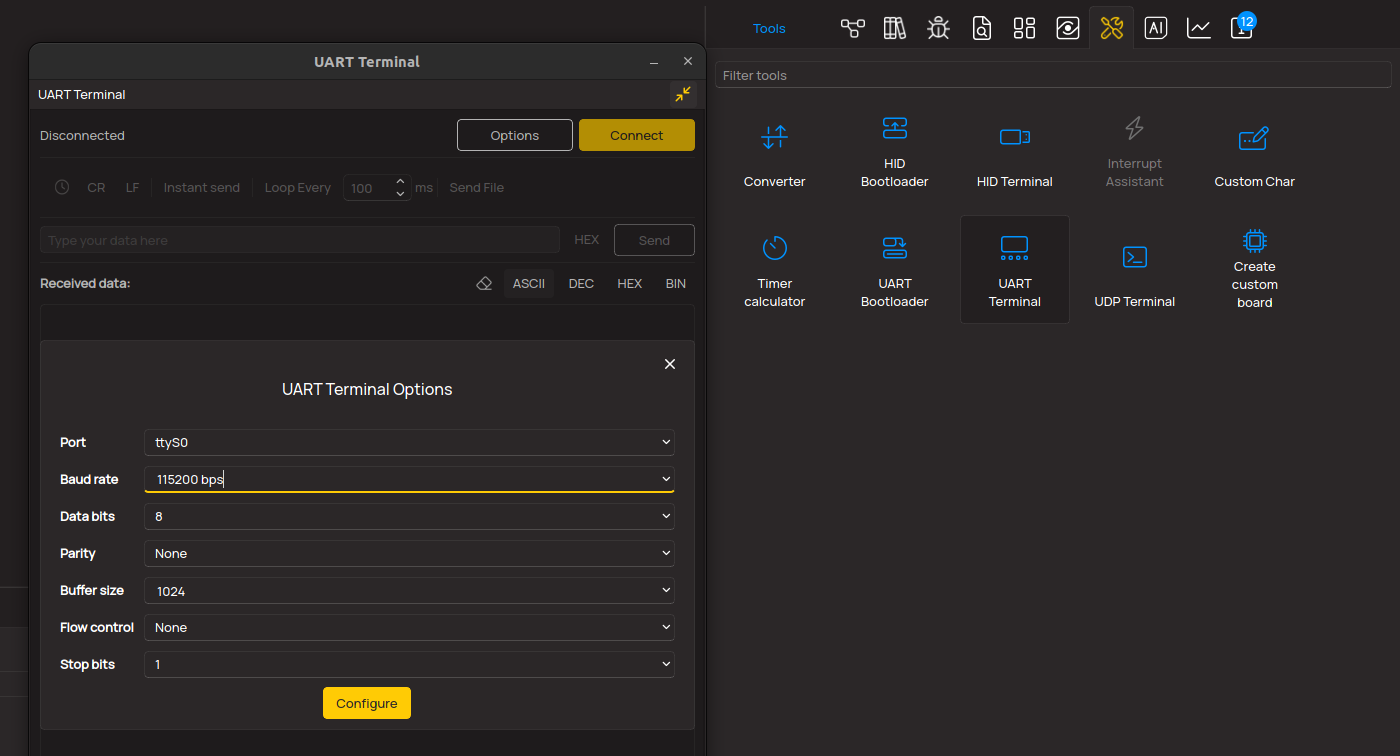
3. Plot 输出 - Plot功能提供了一种强大的方式来可视化实时传感器数据,使趋势分析、调试和多个数据点的对比变得更加直观。要正确设置,请按照提供的教程,其中包含使用Plot功能显示Click board™读数的分步示例。在代码中使用Plot功能时,请使用以下函数:plot(insert_graph_name, variable_name);。这是一个通用格式,用户需要将“insert_graph_name”替换为实际图表名称,并将“variable_name”替换为要显示的参数。
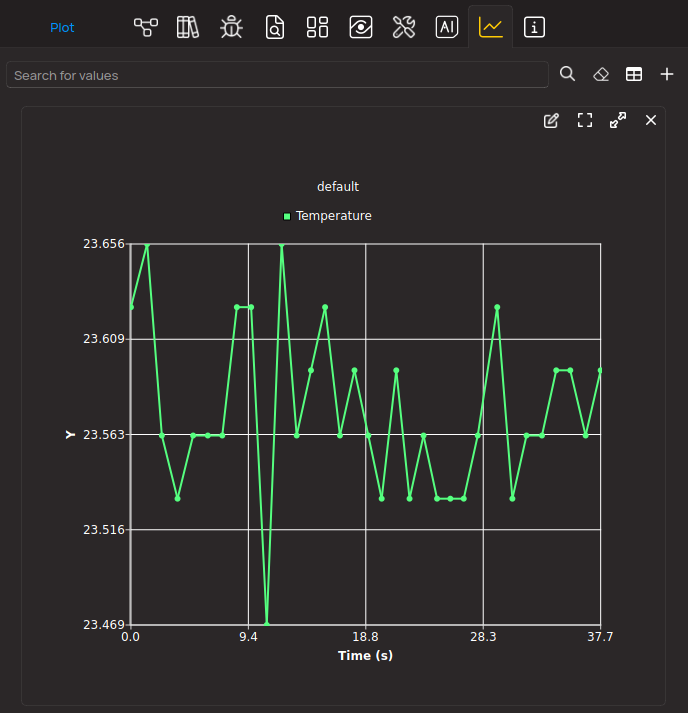
软件支持
库描述
这个库包含 GSM-GPS Click 驱动程序的 API。
关键函数:
gsmgps_send_cmd_with_parameter- 带参数的发送命令函数gsmgps_send_sms_pdu- 以 PDU 模式发送短信的 GSM-GPS 函数gsmgps_generic_parser- 通用解析函数
开源
代码示例
完整的应用程序代码和一个现成的项目可以通过NECTO Studio包管理器直接安装到NECTO Studio。 应用程序代码也可以在MIKROE的GitHub账户中找到。
/*!
* \file
* \brief Gsmgps Click example
*
* # Description
* This example reads and processes data from GSM-GPS Click.
*
* The demo application is composed of two sections :
*
* ## Application Init
* Initializes the driver and powers up the module, then sets default configuration
* for connecting the device to network.
*
* ## Application Task
* Waits for the device to connect to network, then waits for the GPS position fix. Once it get a fix,
* it sends an SMS with GPS info to the selected phone number approximately every 40 seconds.
*
* ## Additional Function
* - static void gsmgps_clear_app_buf ( void )
* - static void gsmgps_error_check( err_t error_flag )
* - static void gsmgps_log_app_buf ( void )
* - static void gsmgps_check_connection( void )
* - static err_t gsmgps_rsp_check ( void )
* - static err_t gsmgps_process ( void )
* - static void gps_parser_application ( void )
*
* @note
* In order for the example to work, user needs to set the phone number to which he wants
* to send an SMS, and also will need to set an APN and SMSC (required for PDU mode only) of entered SIM card.
* Enter valid data for the following macros: SIM_APN, SIM_SMSC and PHONE_NUMBER_TO_MESSAGE.
* E.g.
SIM_APN "vipmobile"
SIM_SMSC "+381610401"
PHONE_NUMBER_TO_MESSAGE "+381659999999"
*
* @author MikroE Team
*
*/
// ------------------------------------------------------------------- INCLUDES
#include "board.h"
#include "log.h"
#include "gsmgps.h"
#include "string.h"
#define APP_OK 0
#define APP_ERROR_DRIVER -1
#define APP_ERROR_OVERFLOW -2
#define APP_ERROR_TIMEOUT -3
#define RSP_OK "OK"
#define RSP_ERROR "ERROR"
#define SIM_APN "" // Set valid SIM APN
#define SIM_SMSC "" // Set valid SMS Service Center Address - only in PDU mode
#define PHONE_NUMBER_TO_MESSAGE "" // Set Phone number to message
#define PROCESS_BUFFER_SIZE 256
#define WAIT_FOR_CONNECTION 0
#define CONNECTED_TO_NETWORK 1
static gsmgps_t gsmgps;
static log_t logger;
static char app_buf[ PROCESS_BUFFER_SIZE ] = { 0 };
static int32_t app_buf_len = 0;
static int32_t app_buf_cnt = 0;
static uint8_t app_connection_status = WAIT_FOR_CONNECTION;
static err_t app_error_flag;
static uint8_t gps_parser_flag = 0;
static uint8_t gps_info_message[ 200 ] = { 0 };
/**
* @brief GSM-GPS clearing application buffer.
* @details This function clears memory of application buffer and reset its length and counter.
* @note None.
*/
static void gsmgps_clear_app_buf ( void );
/**
* @brief GSM-GPS data reading function.
* @details This function reads data from device and concats data to application buffer.
*
* @return @li @c 0 - Read some data.
* @li @c -1 - Nothing is read.
* @li @c -2 - Application buffer overflow.
*
* See #err_t definition for detailed explanation.
* @note None.
*/
static err_t gsmgps_process ( void );
/**
* @brief GSM-GPS check for errors.
* @details This function checks for different types of errors and logs them on UART.
* @note None.
*/
static void gsmgps_error_check( err_t error_flag );
/**
* @brief GSM-GPS logs application buffer.
* @details This function logs data from application buffer.
* @note None.
*/
static void gsmgps_log_app_buf ( void );
/**
* @brief GSM-GPS response check.
* @details This function checks for response and returns the status of response.
*
* @return application status.
* See #err_t definition for detailed explanation.
* @note None.
*/
static err_t gsmgps_rsp_check ( void );
/**
* @brief GSM-GPS check connection.
* @details This function checks connection to the network and
* logs that status to UART.
*
* @note None.
*/
static void gsmgps_check_connection( void );
/**
* @brief GPS parser application.
* @param rsp Response buffer.
* @details This function logs GPS data on the USB UART and stores data in gps_info_message buffer.
*
* @note None.
*/
static void gps_parser_application ( char *rsp );
// ------------------------------------------------------ APPLICATION FUNCTIONS
void application_init ( void )
{
log_cfg_t log_cfg;
gsmgps_cfg_t cfg;
/**
* Logger initialization.
* Default baud rate: 115200
* Default log level: LOG_LEVEL_DEBUG
* @note If USB_UART_RX and USB_UART_TX
* are defined as HAL_PIN_NC, you will
* need to define them manually for log to work.
* See @b LOG_MAP_USB_UART macro definition for detailed explanation.
*/
LOG_MAP_USB_UART( log_cfg );
log_init( &logger, &log_cfg );
log_info( &logger, "---- Application Init ----" );
// Click initialization.
gsmgps_cfg_setup( &cfg );
GSMGPS_MAP_MIKROBUS( cfg, MIKROBUS_1 );
gsmgps_init( &gsmgps, &cfg );
gsmgps_module_power( &gsmgps, GSMGPS_MODULE_POWER_ON );
// dummy read
gsmgps_process( );
gsmgps_clear_app_buf( );
// AT
gsmgps_send_cmd( &gsmgps, GSMGPS_CMD_AT );
app_error_flag = gsmgps_rsp_check( );
gsmgps_error_check( app_error_flag );
Delay_ms ( 500 );
// ATI - product information
gsmgps_send_cmd( &gsmgps, GSMGPS_CMD_ATI );
app_error_flag = gsmgps_rsp_check( );
gsmgps_error_check( app_error_flag );
Delay_ms ( 500 );
// CGMR - firmware version
gsmgps_send_cmd( &gsmgps, GSMGPS_CMD_CGMR );
app_error_flag = gsmgps_rsp_check( );
gsmgps_error_check( app_error_flag );
Delay_ms ( 500 );
// COPS - deregister from network
gsmgps_send_cmd_with_parameter( &gsmgps, GSMGPS_CMD_COPS, "2" );
app_error_flag = gsmgps_rsp_check( );
gsmgps_error_check( app_error_flag );
Delay_ms ( 500 );
// CGDCONT - set sim apn
gsmgps_set_sim_apn( &gsmgps, SIM_APN );
app_error_flag = gsmgps_rsp_check( );
gsmgps_error_check( app_error_flag );
Delay_ms ( 500 );
// CFUN - full funtionality
gsmgps_send_cmd_with_parameter( &gsmgps, GSMGPS_CMD_CFUN, "1" );
app_error_flag = gsmgps_rsp_check( );
gsmgps_error_check( app_error_flag );
Delay_ms ( 500 );
// COPS - automatic mode
gsmgps_send_cmd_with_parameter( &gsmgps, GSMGPS_CMD_COPS, "0" );
app_error_flag = gsmgps_rsp_check( );
gsmgps_error_check( app_error_flag );
Delay_ms ( 1000 );
Delay_ms ( 1000 );
// CREG - network registration status
gsmgps_send_cmd_with_parameter( &gsmgps, GSMGPS_CMD_CREG, "2" );
app_error_flag = gsmgps_rsp_check( );
gsmgps_error_check( app_error_flag );
Delay_ms ( 500 );
// CIMI - request IMSI
gsmgps_send_cmd( &gsmgps, GSMGPS_CMD_CIMI );
app_error_flag = gsmgps_rsp_check( );
gsmgps_error_check( app_error_flag );
Delay_ms ( 500 );
// CGNSPWR - power ON GPS
gsmgps_send_cmd_with_parameter( &gsmgps, GSMGPS_CMD_CGNSPWR, "1" );
app_error_flag = gsmgps_rsp_check( );
gsmgps_error_check( app_error_flag );
Delay_ms ( 500 );
app_buf_len = 0;
app_buf_cnt = 0;
app_connection_status = WAIT_FOR_CONNECTION;
log_info( &logger, " Application Task " );
Delay_ms ( 1000 );
Delay_ms ( 1000 );
Delay_ms ( 1000 );
Delay_ms ( 1000 );
Delay_ms ( 1000 );
}
void application_task ( void )
{
if ( app_connection_status == WAIT_FOR_CONNECTION )
{
// CGATT - request IMSI
gsmgps_send_cmd_check( &gsmgps, GSMGPS_CMD_CGATT );
app_error_flag = gsmgps_rsp_check( );
gsmgps_error_check( app_error_flag );
Delay_ms ( 500 );
// CREG - network registration status
gsmgps_send_cmd_check( &gsmgps, GSMGPS_CMD_CREG );
app_error_flag = gsmgps_rsp_check( );
gsmgps_error_check( app_error_flag );
Delay_ms ( 500 );
// CSQ - signal quality
gsmgps_send_cmd( &gsmgps, GSMGPS_CMD_CSQ );
app_error_flag = gsmgps_rsp_check( );
gsmgps_error_check( app_error_flag );
Delay_ms ( 1000 );
Delay_ms ( 1000 );
Delay_ms ( 1000 );
Delay_ms ( 1000 );
Delay_ms ( 1000 );
}
else
{
log_info( &logger, "CONNECTED TO NETWORK" );
// SMS message format - PDU mode
gsmgps_send_cmd_with_parameter( &gsmgps, GSMGPS_CMD_CMGF, "0" );
app_error_flag = gsmgps_rsp_check( );
gsmgps_error_check( app_error_flag );
Delay_ms ( 1000 );
Delay_ms ( 1000 );
Delay_ms ( 1000 );
for( ; ; )
{
// Get GPS info
gps_parser_flag = 1;
gsmgps_send_cmd_with_parameter( &gsmgps, GSMGPS_CMD_CGPSINF, "2" );
app_error_flag = gsmgps_rsp_check( );
gsmgps_error_check( app_error_flag );
Delay_ms ( 1000 );
Delay_ms ( 1000 );
Delay_ms ( 1000 );
if ( gps_parser_flag == 0 )
{
log_printf( &logger, "> Sending message to phone number...\r\n" );
gsmgps_send_sms_pdu ( &gsmgps, SIM_SMSC, PHONE_NUMBER_TO_MESSAGE, gps_info_message );
app_error_flag = gsmgps_rsp_check( );
gsmgps_error_check( app_error_flag );
// 30 seconds delay
Delay_ms ( 1000 );
Delay_ms ( 1000 );
Delay_ms ( 1000 );
Delay_ms ( 1000 );
Delay_ms ( 1000 );
Delay_ms ( 1000 );
Delay_ms ( 1000 );
Delay_ms ( 1000 );
Delay_ms ( 1000 );
Delay_ms ( 1000 );
Delay_ms ( 1000 );
Delay_ms ( 1000 );
Delay_ms ( 1000 );
Delay_ms ( 1000 );
Delay_ms ( 1000 );
Delay_ms ( 1000 );
Delay_ms ( 1000 );
Delay_ms ( 1000 );
Delay_ms ( 1000 );
Delay_ms ( 1000 );
Delay_ms ( 1000 );
Delay_ms ( 1000 );
Delay_ms ( 1000 );
Delay_ms ( 1000 );
Delay_ms ( 1000 );
Delay_ms ( 1000 );
Delay_ms ( 1000 );
Delay_ms ( 1000 );
Delay_ms ( 1000 );
Delay_ms ( 1000 );
}
}
}
}
int main ( void )
{
/* Do not remove this line or clock might not be set correctly. */
#ifdef PREINIT_SUPPORTED
preinit();
#endif
application_init( );
for ( ; ; )
{
application_task( );
}
return 0;
}
static void gsmgps_clear_app_buf ( void )
{
memset( app_buf, 0, app_buf_len );
app_buf_len = 0;
app_buf_cnt = 0;
}
static err_t gsmgps_process ( void )
{
err_t return_flag = APP_ERROR_DRIVER;
int32_t rx_size;
char rx_buff[ PROCESS_BUFFER_SIZE ] = { 0 };
rx_size = gsmgps_generic_read( &gsmgps, rx_buff, PROCESS_BUFFER_SIZE );
if ( rx_size > 0 )
{
int32_t buf_cnt = 0;
return_flag = APP_OK;
if ( app_buf_len + rx_size >= PROCESS_BUFFER_SIZE )
{
gsmgps_clear_app_buf( );
return_flag = APP_ERROR_OVERFLOW;
}
else
{
buf_cnt = app_buf_len;
app_buf_len += rx_size;
}
for ( int32_t rx_cnt = 0; rx_cnt < rx_size; rx_cnt++ )
{
if ( rx_buff[ rx_cnt ] != 0 )
{
app_buf[ ( buf_cnt + rx_cnt ) ] = rx_buff[ rx_cnt ];
}
else
{
app_buf_len--;
buf_cnt--;
}
}
}
return return_flag;
}
static err_t gsmgps_rsp_check ( void )
{
uint16_t timeout_cnt = 0;
uint16_t timeout = 10000;
err_t error_flag = gsmgps_process( );
if ( ( error_flag != 0 ) && ( error_flag != -1 ) )
{
return error_flag;
}
while ( ( strstr( app_buf, RSP_OK ) == 0 ) && ( strstr( app_buf, RSP_ERROR ) == 0 ) )
{
error_flag = gsmgps_process( );
if ( ( error_flag != 0 ) && ( error_flag != -1 ) )
{
return error_flag;
}
timeout_cnt++;
if ( timeout_cnt > timeout )
{
while ( ( strstr( app_buf, RSP_OK ) == 0 ) && ( strstr( app_buf, RSP_ERROR ) == 0 ) )
{
gsmgps_send_cmd( &gsmgps, GSMGPS_CMD_AT );
gsmgps_process( );
Delay_ms ( 100 );
}
gsmgps_clear_app_buf( );
return APP_ERROR_TIMEOUT;
}
Delay_ms ( 1 );
}
gsmgps_check_connection();
gsmgps_log_app_buf();
return APP_OK;
}
static void gsmgps_error_check( err_t error_flag )
{
if ( ( error_flag != 0 ) && ( error_flag != -1 ) )
{
switch ( error_flag )
{
case -2:
log_error( &logger, " Overflow!" );
break;
case -3:
log_error( &logger, " Timeout!" );
break;
default:
break;
}
}
}
static void gsmgps_log_app_buf ( void )
{
if ( gps_parser_flag == 1 )
{
gps_parser_application( app_buf );
}
else
{
for ( int32_t buf_cnt = 0; buf_cnt < app_buf_len; buf_cnt++ )
{
log_printf( &logger, "%c", app_buf[ buf_cnt ] );
}
log_printf( &logger, "\r\n-----------------------------------\r\n" );
}
gsmgps_clear_app_buf( );
}
static void gsmgps_check_connection( void )
{
#define CONNECTED "+CGATT: 1"
if ( strstr( app_buf, CONNECTED ) != 0 )
{
app_connection_status = CONNECTED_TO_NETWORK;
}
}
static void gps_parser_application ( char *rsp )
{
char element_buf[ 200 ] = { 0 };
memset( gps_info_message, 0, 200 );
gsmgps_generic_parser( rsp, GSMGPS_NEMA_GPGGA, GSMGPS_GPGGA_LATITUDE, element_buf );
if ( strcmp( element_buf, "0000.0000" ) != 0 )
{
strcpy( gps_info_message, "GSM-GPS Click - GPS info\n" );
strcat( gps_info_message, "Latitude: " );
strcat( gps_info_message, element_buf );
log_printf( &logger, "Latitude: %s\r\n", element_buf );
gsmgps_generic_parser( rsp, GSMGPS_NEMA_GPGGA, GSMGPS_GPGGA_LONGITUDE, element_buf );
strcat( gps_info_message, "\nLongitude: " );
strcat( gps_info_message, element_buf );
log_printf( &logger, "Longitude: %s\r\n", element_buf );
memset( element_buf, 0, sizeof( element_buf ) );
gsmgps_generic_parser( rsp, GSMGPS_NEMA_GPGGA, GSMGPS_GPGGA_ALTITUDE, element_buf );
strcat( gps_info_message, "\nAltitude: " );
strcat( gps_info_message, element_buf );
log_printf( &logger, "Altitude: %s m\r\n", element_buf );
gps_parser_flag = 0;
}
else
{
log_printf( &logger, "Waiting for the position fix..." );
}
log_printf( &logger, "\r\n-----------------------------------\r\n" );
}
// ------------------------------------------------------------------------ END




















